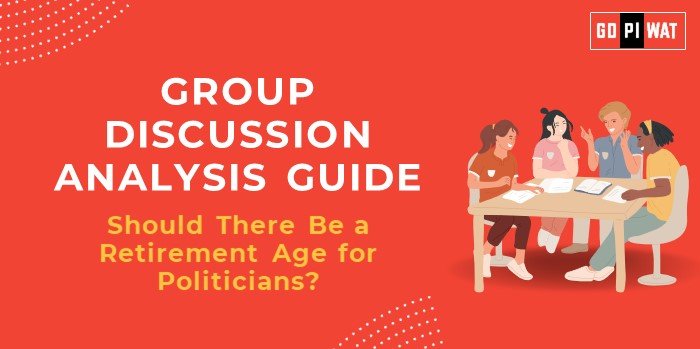📋 Group Discussion Analysis Guide: Should There Be a Retirement Age for Politicians?
🌐 Introduction to the Topic
- Context: Globally, age-related debates are common across professions, yet politics often lacks enforced retirement norms. In India, with a median age of 28 years but political leadership largely dominated by individuals over 60, the topic sparks a crucial discourse on generational equity and governance efficacy.
- Background: The absence of a mandated retirement age in Indian politics allows leaders to serve indefinitely, unlike bureaucrats or judges who face mandatory retirement ages. This has fueled debates on whether this policy enhances wisdom in leadership or obstructs opportunities for younger politicians.
📊 Quick Facts and Key Statistics
• 🧑⚖️ Median Age of Indian Population (2024): 28 years – Highlights generational gap in leadership.
• 🏛️ Average Age of Indian MPs (2024): 58 years – Reflects senior dominance in decision-making roles.
• 🌏 Countries with Retirement Age for Politicians: China (68 for Politburo), Malaysia (75 for senators) – Demonstrates global precedents.
• 📈 Life Expectancy in India (2024): 70.8 years – Raises questions on health and energy for political roles at older ages.
• 🏛️ Average Age of Indian MPs (2024): 58 years – Reflects senior dominance in decision-making roles.
• 🌏 Countries with Retirement Age for Politicians: China (68 for Politburo), Malaysia (75 for senators) – Demonstrates global precedents.
• 📈 Life Expectancy in India (2024): 70.8 years – Raises questions on health and energy for political roles at older ages.
🎯 Stakeholders and Their Roles
- 🗳️ Voters: Demand youth representation or value experience.
- 🏢 Political Parties: Define leadership pipelines and age inclusivity.
- 🌟 Youth Leaders: Advocate for opportunities and inclusion.
- 📜 Senior Politicians: Contribute wisdom but risk being perceived as out-of-touch.
🏆 Achievements and Challenges
Achievements
- ✅ Experience Matters: Senior politicians offer decades of governance expertise.
- 🔗 Continuity of Leadership: Ensures stability in political vision and policies.
- 🌍 Global Representation: Elder leaders often command greater respect internationally.
Challenges
- 🚧 Generational Disconnect: Young populations may feel alienated by older leadership.
- ⚕️ Health Concerns: Aging politicians risk health-related disruptions in governance.
- 📉 Blocked Opportunities: Limits political mobility for younger aspirants.
🌎 Global Comparisons
- 🇨🇳 China: Mandatory retirement ensures a rejuvenated leadership pipeline.
- 🇫🇷 France: Policies encouraging younger leaders have resulted in vibrant political dynamics.
📚 Case Study
Kerala: Leadership transitions in the Left Democratic Front demonstrate balanced generational representation.
🗣️ Structured Arguments for Discussion
- Supporting Stance: “A retirement age ensures fresh ideas and energy in governance.”
- Opposing Stance: “Age brings wisdom and experience, which are invaluable in politics.”
- Balanced Perspective: “While experience is critical, institutionalizing generational equity would foster inclusivity.”
💡 Effective Discussion Approaches
Opening Approaches
- 📊 Statistics-Based: “India’s median age is 28, yet the average MP is 58. Is this a generational mismatch?”
- 🌍 Global Benchmarking: “China and Malaysia impose retirement limits on politicians. Should India follow suit?”
- ⚖️ Contrast Opening: “While civil servants retire at 60, politicians remain exempt. Should the rules be consistent?”
Counter-Argument Handling
- 🤝 Acknowledge contributions of senior leaders.
- 🌟 Highlight examples of successful young leaders globally and domestically.
- 👨🏫 Suggest non-compulsory transitions like mentorship roles for senior politicians.
🔍 Strategic Analysis of Strengths and Weaknesses
- Strengths: Experienced leaders, institutional knowledge.
- Weaknesses: Risk of stagnation, generational disconnect.
- Opportunities: Youth engagement, fresh policy approaches.
- Threats: Resistance from established political figures.
🎓 Connecting with B-School Applications
- 🌐 Real-World Applications: Exploring governance models, leadership pipelines, and policy formulation.
- 🗨️ Sample Interview Questions:
- “Should leadership renewal be a priority in governance?”
- “How can political systems ensure both experience and innovation?”
- 📖 Insights for Students: Understanding political HR management, addressing generational challenges in leadership.


